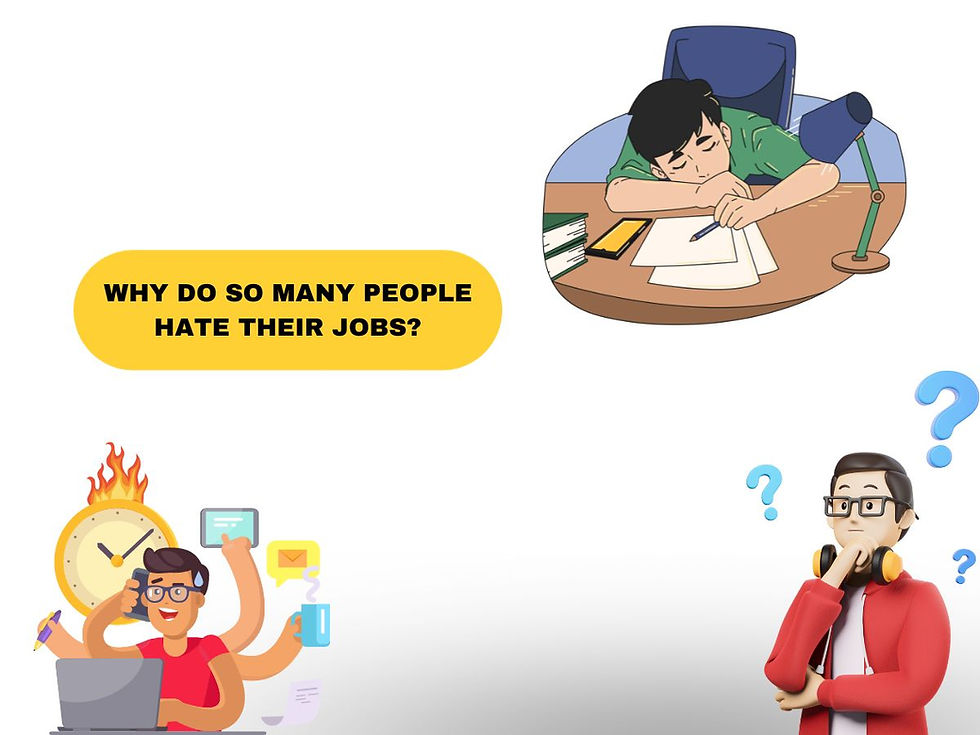
Many people harbor negative feelings about their jobs for a variety of reasons. Job dissatisfaction is a complex issue influenced by personal, organizational, and societal factors. Here are some common reasons why many individuals dislike their jobs:
Lack of Engagement: Some jobs can be monotonous and fail to stimulate employees intellectually or emotionally. When work lacks challenge and meaningful tasks, employees may become disengaged and feel unfulfilled.
Inadequate Compensation: Low wages or a lack of opportunities for pay raises can lead to dissatisfaction. Financial stress and the feeling of being undervalued are common consequences of inadequate compensation.
Poor Work-Life Balance: Jobs that demand excessive working hours or involve frequent overtime can erode work-life balance. When employees are unable to maintain a healthy equilibrium between their professional and personal lives, it can lead to frustration and unhappiness.
Toxic Work Environment: A hostile or toxic workplace can be emotionally draining. Bullying, harassment, a lack of support from colleagues or supervisors, and a culture of fear can contribute to high levels of job dissatisfaction.
Limited Career Growth: A lack of opportunities for career advancement and professional development can cause employees to feel stagnant in their roles. This feeling of being stuck can lead to job dissatisfaction.
Mismatched Skills and Interests: Some people end up in jobs that do not align with their skills, interests, or values. Working in a role that does not resonate with one's passions can result in unhappiness.
Micromanagement: Overly controlling or micromanaging supervisors can make employees feel undervalued, stifled, and anxious about their job performance.
Job Insecurity: In industries prone to layoffs, job insecurity can lead to persistent stress and job dissatisfaction. Fear of losing one's job can have detrimental effects on an employee's well-being.
Unmanageable Workload: Excessive workloads and unrealistic expectations can cause employees to feel overwhelmed and burnt out. This can lead to physical and mental health issues.
Lack of Autonomy: Some jobs offer little room for decision-making or independence. When employees have no control over their work processes, they may feel disempowered and unappreciated.
Inadequate Recognition: A lack of recognition for one's efforts and achievements can be demoralizing. Feeling unappreciated can diminish job satisfaction.
Boredom and Repetition: Jobs that involve routine tasks with little variation can lead to boredom and a lack of enthusiasm. Over time, employees may come to resent the predictability of their work.
Commute: Lengthy and stressful commutes can detract from job satisfaction. Spending hours in traffic or on public transportation can lead to frustration and exhaustion.
Ethical or Moral Conflicts: Some individuals work in industries or roles that conflict with their personal ethics or values. Such conflicts can lead to inner turmoil and job dissatisfaction.
Unclear Expectations: When employees do not fully understand their roles or receive vague instructions, it can lead to confusion and frustration.
Unfulfilled Career Goals: If people feel their current jobs are not aligned with their long-term career aspirations, it can result in disappointment and resentment.
Health and Safety Concerns: Jobs that pose health and safety risks can lead to anxiety and discontent, especially if adequate safety measures are not in place.
Lack of Flexibility: Inflexible work arrangements can be particularly challenging for individuals with family responsibilities or other commitments. The inability to achieve a work-life balance can lead to dissatisfaction.
Inadequate Benefits: Employees who receive insufficient benefits, such as healthcare, retirement plans, or paid time off, may feel undervalued by their employers.
Impact of COVID-19: The COVID-19 pandemic introduced remote work, which improved work-life balance for some but increased isolation and stress for others. The pandemic also disrupted job stability for many.
It's important to recognize that job dissatisfaction can have significant consequences for an individual's overall well-being. Chronic job dissatisfaction can lead to stress, burnout, and negative effects on mental and physical health. Addressing job dissatisfaction may involve seeking a new job, talking to supervisors about concerns, seeking professional guidance, or making personal changes to improve the work-life balance.
Employers can also play a crucial role in mitigating job dissatisfaction by creating positive work environments, offering opportunities for career growth, and acknowledging and rewarding employees for their contributions. Ultimately, finding job satisfaction often involves a combination of personal and organizational efforts to create a more fulfilling work experience.

Comentarios